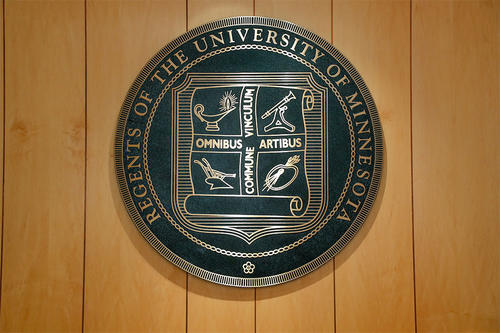Initial findings from U of M’s PEAK initiative highlight opportunities for operational efficiencies

Following several months of extensive data collection, research and analysis, leaders of the Positioned for Excellence, Alignment and Knowledge (PEAK) initiative met with the University of Minnesota Board of Regents on Wednesday to discuss initial findings, as well as potential strategic direction and recommendations moving forward.
This systemwide effort, co-chaired by Senior Vice President for Finance and Operations Myron Frans and Vice President for Human Resources Ken Horstman, is designed to identify and develop new approaches to providing administrative and support services across a wide range of functions. By identifying ways to increase efficiency, improve service or gain capacity, the University can better support its students and Minnesotans statewide as it delivers its teaching, research and service mission.
The PEAK initiative has been led by the same vision embraced by the University of Minnesota’s MPact 2025 strategic plan. The University must invest effort on strategic goals designed to increase efficiency so that the highest percentage of every dollar the University has may be devoted to core mission activities. To achieve this result, work so far has focused on critical decisions that enable the University to be good stewards of its resources.
“This is important work that is happening at a critical moment in our University’s history,” said Board Chair Ken Powell. “At this early stage of the effort, PEAK data already illustrate opportunities to better align the University’s work with our priorities to maximize people’s effort and the University’s budget.”
Huron Consulting and KPMG were engaged to provide outside perspective and expertise on this work. During Wednesday’s Board meeting, both Huron and KPMG shared updates that included data collected earlier this year and forward-looking recommendations.
Broadly distributed surveys with notably high response rates (80-plus percent) helped identify overarching themes related to work in 12 administrative functions being examined through PEAK. Some of those themes include:
- The University System is highly decentralized with many administrative activities occurring across various areas.
- Many respondents report performing multiple functions, often described as “wearing many hats.”
- Because of the University’s size, the variety of its work and its statewide distribution, the experiences of employees with similar jobs can vary greatly.
- Delivering services for their department, unit, college or campus is an important priority for University employees.
Based on this initial work, PEAK initiative leaders identified opportunities to improve service delivery and enable systemic change to create sustainable efficiencies. Initial recommendations are generally grouped under organizational design, management processes, talent and culture, and technology, data and metrics.
“The PEAK Initiative will help position the University in sustainable ways over the long term by supporting administrative systems that are more flexible and allow for dollars to be reinvested in higher-priority efforts,” Frans said.
The recommendations shared with the Board will continue to evolve in ongoing consultation with administrative leadership and campus governance groups representing students, faculty and staff. Through the rest of the summer and into the fall, a roadmap will be developed to guide next steps and implementation. The Board is anticipated to review the roadmap in October.
Also Wednesday, the Board:
- Recognized the University’s outgoing Chief Auditor Gail Klatt, who is retiring after 27 years of University service.
- Ratified the membership and charge for the Chief Auditor search advisory committee.
- Received an annual update from the University of Minnesota Alumni Association.
- Discussed campus-level strategic planning with leaders from the Morris campus, the latest and last in a series of campus-level strategic planning conversations that have already included Crookston, Duluth and Rochester.
- Received an update on master planning from the Twin Cities campus.
The Board of Regents is scheduled to meet next on Sept. 9-10, 2021. Visit regents.umn.edu for more information.
- Categories:
- Campus Affairs
- Board of Regents





